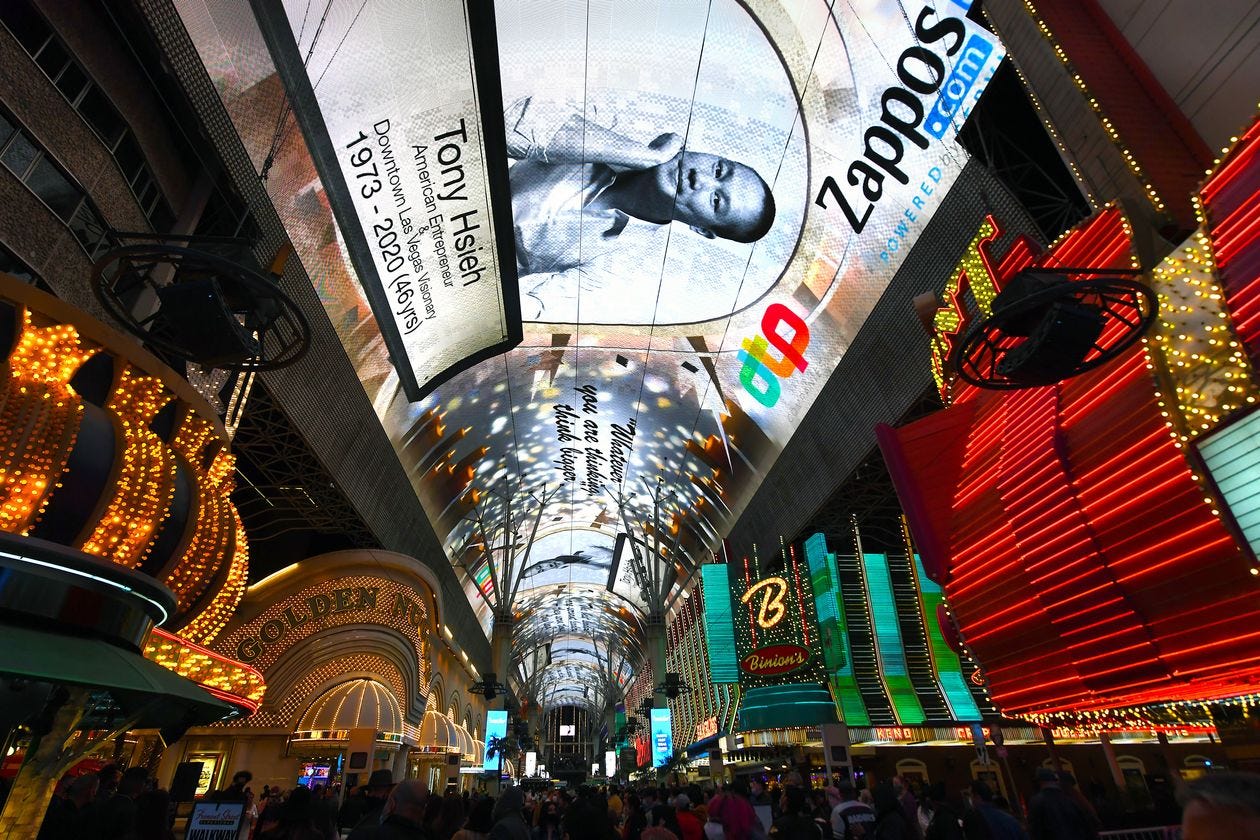Tony Hsieh's Death and Delivering Happiness
When I was a young man about building a career, I went on a business book kick. I read Malcolm Gladwell about tipping points, and James Collins about good to great. And I read Tony Hsieh about Delivering Happiness.
Not that I was a Zappos customer or had even heard of Zappos. But I have a vague recollection that I read some review about it, and I’m sure said review likely referred to Hseih as a guru, or a visionary, or maybe a pioneer. The point was: he was worth reading.
Then last week, I saw in passing that Hseih had died. The Wall Street Journal headline was more vivid than most obituaries: The Death of Zappos’s Tony Hsieh: A Spiral of Alcohol, Drugs and Extreme Behavior.
I flashed back to his book, remembrances of Hseih’s obsession with company culture, my memory that he was an early voice that broke out from the usual Silicon Valley focus on productivity, my affinity for his admonitions to make sure you are spending your time in this world doing things which make you, well, happy.
A little ways down the WSJ article came this quote from Hseih’s book:
Ultimately happiness is really just about enjoying life.
I actually remember reading that more than a decade ago. And I remember thinking at the time: really? Could ultimate happiness be that simple?
Hseih’s assertion stayed with me a while, until it faded, as things do. Reading about the circumstances of Hseih’s death puts the assertion in a different light from which I read it. According to the Journal’s piece, Hseih died of complications related to smoke inhalation following what appears to be an episode in which he barricaded himself inside a storage area.
Whether Hseih’s death was an accident or something more intentional it’s tough to discern from the details. Apparently he was into drugs, and extreme fasting, and heavy drinking. It seems he was depressed, but also in search of something, and maybe the something he was searching for could have been found from fasting, or drugs, or from oxygen deprivation, or some other bodily experiment.
He was 46 years old, and four months retired.
Hseih had continued to run Zappos until August of 2020, turns out. That feels like a long time to be running one company, especially considering Amazon bought it in 2009, for $1.2 billion — at the time, its largest acquisition ever. After the purchase, Hseih stayed on as chief executive. His identity seemed inextricably linked to the company.
During his career, Hseih “helped reshape customer service.” Zappos employees “relished Mr. Hsieh’s eagerness for them to express their individuality and carve out their own roles in a company with few bureaucratic boundaries,” according to the Journal article.
In 2012, Hseih donated $350 million to revitalize downtown Las Vegas, a city in which he is beloved. And also, it seems, a city which fit well Hseih’s affinity for partying. In Delivering Happiness, Hseih wrote that shots of Grey Goose vodka were a company tradition. After relocating from Las Vegas to Park City Utah earlier this year, friends who moved with him encouraged his alcohol and drug abuse, according to the story.
As I read deeper into the piece, all I could think was, this is a tragedy. A true tragedy, though WSJ hadn’t used that word (later on, I saw that CNBC did use it). I saw Hseih’s life like a movie: young CEO builds billion dollar company, transforms how we think about business, writes best-selling book, but then retires and, for a time, neither he nor the audience can tell the difference between “enjoying life,” and entering a downward spiral, until it’s too late of course.
I suppose the part that’s stuck with me this past week is just that question: if I do nothing but enjoy life, does that mean I’m happy? And what if enjoying life means I drink a little too much booze every night, or I stay up a little too late, out dancing, partying, experimenting? When does living in the moment, making moments, become something different, in the long run?
This past August I embarked on kind of a crazy act of self-experimentation: eating only food that came from my own property. I lost 15 pounds in one month, dropping weight down to something like when I was in College, all the while climbing 3-4 times a week, hiking big mountains with my son, and working most afternoons on a renovation project. I never felt weak, or faint — just hungry.
Maybe Hseih’s experiments felt to him like mine felt to me: nothing actually too crazy about it, just the two of us seeing where things would lead if we thought outside the box a little.
Or, maybe he and I are totally different: him the depressed visionary who never found solid ground after retiring from the company he built, and me a largely responsible family man who keeps all his self-destructive impulses well on this side of normal.
Yet Hseih’s assertion — that ultimately happiness is really just about enjoying life — is tough to refute, difficult to argue with. What alternative definition of happiness would you like to advance that is as simple and as actionable as his?
Or what about this, which I’ve often written some version of in this newsletter: how you spend your time is how you spend your life, so you should spend your time doing things you love to do. Moments make up a life. Every day, every week, every year.
How different is that, really, from what Hseih said? He may have used fewer words, but it’s a similar sentiment.
WSJ ended its piece on Hseih with this:
The family said they planned to “carry on his legacy by spreading the tenets he lived by—finding joy through meaningful life experiences, inspiring and helping others, and most of all, delivering happiness.”
Amen to that. Rest in peace, Tony.


